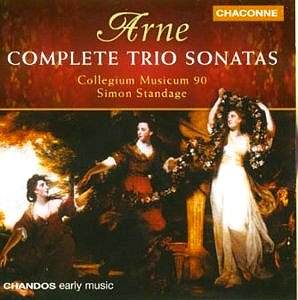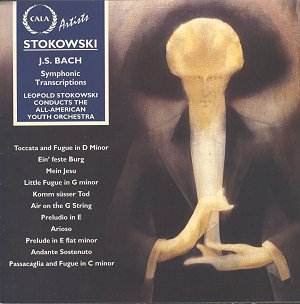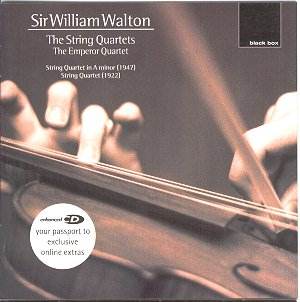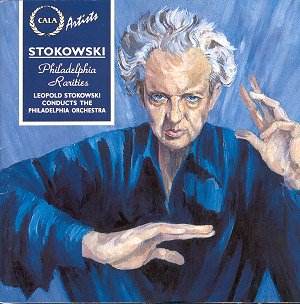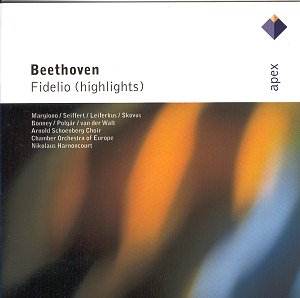 Composer: Ludwig van Beethoven
Composer: Ludwig van Beethoven
Works: Fidelio (highlights)
Performers: Florestan – Peter Seiffert (tenor), Leonore – Charlotte Margiono (soprano), Rocco – László Polgár (bass), Marzelline – Barbara Bonney (soprano), Jaquino – Deon van der Walt (tenor)
Recording: Recorded at Stefaniensaal, Graz, June 1994
Label: Warner Classics
Beethoven’s “Fidelio,” his singular opera, embodies a powerful fusion of personal struggle and political idealism, set against a backdrop that grapples with themes of oppression and the triumph of love. Rooted in a historical context of revolutionary fervor, the opera reflects Beethoven’s own existential battles, notably his encroaching deafness and the emotional turmoil of unrequited love. The work, initially conceived as a singspiel, underwent various transformations before arriving at its final two-act form, which premiered in 1814. The current highlights recording under Nikolaus Harnoncourt, featuring the Chamber Orchestra of Europe, offers a fresh perspective on this dramatic narrative, showcasing the inherent tensions and fervent passions that Beethoven imbued within his music.
Harnoncourt’s interpretation exhibits a keen awareness of the opera’s emotional landscape, particularly in the overture, which, despite moments of uneven tempi, delivers a strikingly crisp articulation of Beethoven’s themes. The overture serves as an emotional prelude, encapsulating the tension and urgency that characterizes the opera’s narrative arc. Notably, Harnoncourt’s orchestra captures the frenzied energy of the concluding sections, although it occasionally risks overshadowing the singers with its exuberance. This dynamic interplay between orchestra and voice is crucial in conveying the opera’s dramatic essence, yet one notes instances where balance could be improved to allow for greater clarity in the vocal lines.
Barbara Bonney’s portrayal of Marzelline stands out, her aria “O wär’ ich schon mit dir vereint” rendered with exquisite clarity and a heartfelt longing that brings the character’s emotional plight to the forefront. Bonney’s lyrical line and sensitive phrasing highlight her character’s youthful innocence and yearning, effectively juxtaposed against Deon van der Walt’s Jacquino, who delivers a tender, understated performance. László Polgár’s Rocco possesses a rich, resonant bass that enhances the character’s gravity, particularly in the ‘Gold’ aria, where the interplay of spoken recitative and aria showcases his vocal prowess, albeit with a slight diminishment of expressivity in the latter.
Charlotte Margiono’s Leonore is technically accomplished, her high notes executed with impeccable control, yet a deeper emotional engagement would elevate her performance. The nuances of her character’s desperation and determination, particularly in the ensemble scenes, could benefit from a more pronounced dramatic intensity. Peter Seiffert’s Florestan emerges with a nuanced portrayal, though the arrangement of the highlights may detract from the full impact of his opening aria, which traditionally establishes the character’s dire situation. Despite this, Seiffert’s vocal agility shines through, particularly in his interactions with Margiono’s Leonore during the finale, where their voices intertwine beautifully, culminating in a thrilling resolution bolstered by the robust contributions of the Arnold Schoenberg Choir.
The sound quality of this recording, engineered by Teldec, offers a vibrant listening experience, though the orchestral exuberance at times threatens to eclipse the vocal lines. The clarity of the recording allows for an appreciation of the intricate details within the orchestration, yet a more judicious balance would enhance the overall impact of the singers’ performances. When juxtaposed with other notable recordings, such as those featuring conductors like Herbert von Karajan or Claudio Abbado, Harnoncourt’s interpretation may lack the grandiosity often associated with “Fidelio,” but it compensates with a thoughtful, intimate approach that reveals the opera’s deeper emotional currents.
This highlights recording of “Fidelio” under Nikolaus Harnoncourt presents a compelling interpretation of Beethoven’s only opera, filled with moments of vocal brilliance and orchestral vitality. While some performances may lack the dramatic heft that the narrative deserves, the overall execution offers a valuable insight into the complexities of the characters and the socio-political themes that permeate the work. The artistry of the performers, especially Bonney and Seiffert, alongside Harnoncourt’s insightful direction, ultimately renders this recording a significant contribution to the Beethoven discography, worthy of both study and enjoyment.
